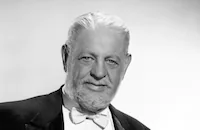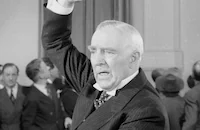Something for the Boys
Brief Synopsis
Cast & Crew
Lewis Seiler
Carmen Miranda
Michael O'shea
Vivian Blaine
Phil Silvers
Sheila Ryan
Film Details
Technical Specs

Synopsis
After cousins actress Blossom Hart, defense plant worker Chiquita Hart and inventor Harry Hart each learn that they are heirs to a large plantation in Masonville, Georgia, they travel separately to Masonville, and in the office of lawyer Col. Jefferson L. Calhoun, meet for the first time. As they are all poor, they are thrilled by the inheritance, but when Calhoun takes them to Magnolia Manor, they discover that the once glorious plantation house is now a ruin. In addition, paying the plantation's various property and inheritance taxes will put them deeply in debt. While the cousins are bemoaning their fate, Staff Sgt. Ronald "Rocky" Fulton, who was a well-known orchestra leader before joining the military, arrives with some of his men, including Sgt. Laddie Green. Rockie explains that the married service men of nearby Camp Dixon want to rent rooms in the manor for their wives, who have been unable to live close to their husbands due to a lack of available housing. The men pitch in and help the cousins fix up the manor, although Chiquita is continually bothered by the fact that she can pick up radio programs on the fillings in her teeth. Rocky, who has begun a romance with Blossom, suggests that they put on a musical show to raise funds for the renovations. On the day that "The Old Southern Corn Revue" is to open, Blossom is stunned by the arrival of Melanie Walker, a snobbish, rich woman, who Rocky is forced to admit is his fiancée. Melanie, believing that Rocky has arranged for the manor to be let just for her, imperiously announces the changes she intends to make, and the infuriated Blossom refuses to speak to Rocky. Before the show, Rocky explains to a disapproving Chiquita that he loves only Blossom. The show is a big success, and the next morning, Chiquita advises Blossom to fight for Rocky if she loves him. The snooty Melanie ends up covered with eggs after she tries to work one of Harry's new inventions, and she seeks solace from Lt. Ashley Crothers. While the lieutenant is there, he discovers that Harry is hosting a dice game for some of the soldiers, none of whom have wives staying at the manor. Crothers arrests the soldiers and recommends that the house be posted as off-limits for all military personnel. Col. Grubbs approves Crother's suggestion, and soon the wives are packing to leave. Meanwhile, after Harry learns that carborundum from the defense plant got into Chiquita's fillings and is causing her to receive radio programs, he decides to build an invention around the idea. One afternoon, Rocky comes to the house to try to talk to Blossom, who refuses to see him. Rocky is supposed to be on duty for war games, and is captured by the "enemy" army, which has taken over the manor as its headquarters. Hoping to save both his stripes and the manor, Rocky enlists the aid of Chiquita and Harry, who begin building a transmitter to send a message to Rocky's unit via Chiquita's teeth. The message is sent, and the cousins distract the "enemy" army with a song and dance show while Rocky's army assembles for its attack. Soon after, Rocky's side has prevailed in the manuevers, and in appreciation of Blossom, Chiquita and Harry's help, the off-limits sign is removed and the manor is once again the site of much happiness for the military men and their wives. At a celebratory party, Rocky announces that he has been selected for officer's candidate school, and the happy Blossom reconciles with him.

Director
Lewis Seiler
Cast

Carmen Miranda

Michael O'shea

Vivian Blaine

Phil Silvers

Sheila Ryan

Perry Como
Glenn Langan
Roger Clark

Cara Williams

Thurston Hall

Clarence Kolb
Paul Hurst
Andrew Tombes
Jimmy Dodd
William "red" Murphy
Russell Hoyt
Garry Owen
Robin Short
Gordon Wynne
Larry Thompson
The Banda Da Lua

Frank Mccown
Mary Stewart
Esther Brodelet
Grace Davies
Evelyne Eager
Billie Lane
Valerie Traxler
Bernice Lynne
Doris Schaffer
Janet Graves
Jean Mcclure
Jo Ann Dean
Mabel Boehlke
Midgie Dare
Nancy Hale
Maxine Carole
Peggy Lou Neary
Riley Thompson
Crew
Harold Adamson
Ary Barroso
Col. Phillip W. Booker
Sid Bowen
Nick Castle
Hugh Cummings
Mack Elliott
Robert Ellis
W. D. Flick
Frank Gabrielson
Roger Heman
Charles Henderson
Albert Hogsett
Arthur Jacobson
Natalie Kalmus
Katherine Lambert
Thomas Little
Helen Logan
Bud Mautino
Jimmy Mchugh
Richard Mueller
Kay Nelson
Emil Newman
Ernest Palmer
Guy Pearce
Cole Porter
Frances Richardson
Walter M. Scott
Fred Sersen
Robert Simpson
Murray Spivack
Irving Starr
Vinton Vernon
Lyle Wheeler
Yvonne Wood
Joseph C. Wright

Film Details
Technical Specs

Quotes
It's still a grand old place, must be at least a hundred and twenty-five years old.- Col. Jefferson Calhoun
Oh come now, Colonel, it couldn't get this old in a hundred and twenty-five years!- Harry Hart
What a letdown. I think I'm going to be a Southern belle and I get sold down the river.- Chiquita Hart
Trivia
Notes
According to information in the Twentieth Century-Fox Records of the Legal Department, located at the UCLA Arts-Special Collections Library, in November 1942, the studio advanced $62,500 to Michael Todd and Savoy Productions for production of the musical, then purchased the screen rights to it in 1943. Although the legal records give the purchase price as $265,000, a March 12, 1943 Hollywood Reporter news item lists the amount paid by Fox as $305,000. Per the agreement with Todd, Fox could not release the film until at least the summer of 1944, which, as Hollywood Reporter noted, was to "enable the stage original to play the key cities and tour without competition from the celluloid version." Only one of Cole Porter's songs for the musical was included in the film version. Hollywood Reporter news items note that William Perlberg was originally slated to produce this film, Irving Cummings was to direct it and Betty Grable was to star in it. In January 1944, Bruce Humberstone was assigned to direct the picture and Brenda Marshall was set for the female lead. According to Hollywood Reporter, Humberstone auditioned The Jeepers, a seven-piece novelty orchestra, but they do not appear in the finished film. Although a February 23, 1944 Hollywood Reporter news item noted that dance director Nick Castle was working with Carmen Miranda to prepare a "four-movement, symphonic treatment" of the popular song "Mairzy Doats," the number was not included in the film. In April 1944, Hollywood Reporter noted that Scott Elliott had been tested for the film, but his participation in the finished picture has not been confirmed. Although a Hollywood Reporter news item and studio press releases include Billie Seward, Stanley Prager, Chester Conklin, Harry Seymour and Jo-Carroll Dennison in the cast, they do not appear in the completed film. The picture marked the screen debuts of popular singer Perry Como and actor Rory Calhoun, who appeared under the name Frank McCown. Modern sources also include Judy Holliday in the cast. A studio credit sheet lists the film's running time as 78 min.
According to information in the legal records and the Twentieth Century-Fox Produced Scripts Collection, the following writers worked on various versions of the screenplay: Harry Segall, Marian Spitzer, Eddie Welch, Snag Werris, Samuel Hoffenstein and Betty Reinhardt. The extent of their contributions to the completed film has not been confirmed, however. Notes from a January 12, 1944 studio conference reveal that production head Darryl F. Zanuck wanted the same writers who wrote Greenwich Village, a 1944 Twentieth Century-Fox picture starring Carmen Miranda, to write Miranda's dialogue for this film, because "they wrote especially for her, with mispronunciations, etc., and she is very funny when she is given this style of writing." The Greenwich Village screenwriters did not contribute to Something for the Boys, but Miranda's trademark mangling of the English language is included in the film. The studio records also note that the "Southland Routine," which is performed by Phil Silvers, includes excerpts from the following songs: "Southland" by Silvers, Harold Adamson and Jimmy McHugh; "Dixie's Land" by Dan Emmet; "All Over God's Heaven," traditional spiritual; "Shortnin' Bread," words by Jacques Wolfe, music traditional; "Indian Dance" by Urban Theilman; and "Climin' Up Dem Golden Stairs" by McHugh and Adamson. The studio records contain letters from songwriters Jule Styne and Sammy Cahn, who stated that the "Southland Routine" was based on their work. In early 1945, Twentieth Century-Fox paid the composers three thousand dollars not to pursue their claim. According to a February 3, 1943 Hollywood Reporter news item, owners of the radio show The Court of Missing Heirs filed an infringment of copyright lawsuit against the producers and owners of the play Something for the Boys. The owners of the radio program alleged that the play infringed on their show's premise. The disposition of the suit is unknown.












